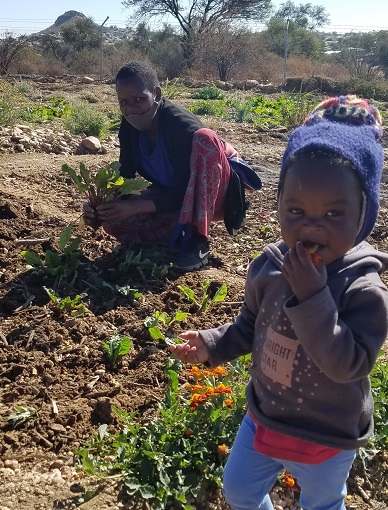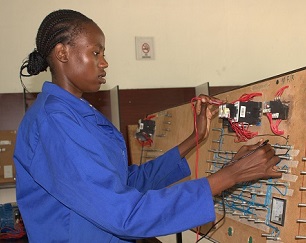
Community gardening initiative handed over to the city fathers

Local stakeholders, the City of Windhoek has now taken over activities at Farm Okukuna, in Windhoek’s informal settlement Goreangab. The World Future Council announced this recently in a statement, when they handed it over to the municipality.
Farm Okukuna was started in 2018 as a project of three partners. The World Future Council, funded by the Liselotte Foundation, was responsible for management and fundraising. The Eloolo Permaculture Initiative facilitated training. The City of Windhoek, who owns the land, acted as a landlord, providing the land, security and water.
“A project so successful that it is taken over by local stakeholders – this is what one wants to achieve as a donor,” said Ina Wilkie, Senior Project Manager of the World Future Council. We wish the City of Windhoek all the very best in continuing the work,” she added.
Over the past three years, a wide range of programmes have taken place at Farm Okukuna. Ina Wilkie of the World Future Council had taken the lead, also raising third-party funding from the German Liselotte Foundation and the UK Waterloo Foundation as well as the Southern African Innovation Support Fund (SAIS). What started as a Permaculture community garden three years ago is now an established project.
According to Wilkie community members have founded a voluntary association to manage processes and income on the farm. 16 members tend to their individual gardens, producing food for their families and for sale. The process was accompanied by many facilitated discussions, training and investments into tools and infrastructure.
“My garden is really important to me,” said Auguste Kankono, resident of Goreangab. “It provides me with income and keeps me away from the location. I wake up early to come here and look after my garden. My whole family is excited and my neighbours are ordering vegetables from me.”
Compost, seedlings and natural pest repellents are produced at the Farm Okukuna product centre.
The partners procure the materials and support with marketing. The products, however, belong to the producers who are people from the community. Every team member decides how much work they put in and therefore how much money they earn.
The products are developed together with local experts. The Okukuna SPICE compost, for example, a brainchild of facilitator Wiebke Volkmann, has already acquired some fame on the local market. It contains more carbon and nitrogen than other composts. It combines bacterial and fungal decompo-sition through an initial aerobic process which generates heat for killing weed seeds and pathogens, followed by low oxygen fermentation that breaks down material faster. Farm Okukuna compost is sold through retail outlets such as Agrigro and at the Green Market in Klein Windhoek on Saturdays. Monthly Open Days at Farm Okukuna have also been an opportunity for sales and income generation.
“Compost production does not only provide me with income, but also with knowledge and experience,” Halleluja Ruusa Inane, resident of Goreangab explained. “We really hope that we can continue.”
From the beginning, the Training Centre has been an integral part of Farm Okukuna. It had a focus on Permaculture which is a way to grow food and organise your life with minimal external inputs and therefore ideal for people with little money. Trainings were facilitated by the Namibian Eloolo Perma-culture Initiative and South African Permaculture Activists.
A Masterclass Programme gave a local agriculture graduate the opportunity to gain further qualification.
“As an agriculture graduate it is difficult to find a job. Most employers look for people with experience. It was fabulous for me to work here and get the opportunity to learn about planting and designing. Permaculture really opened my eyes,” explained Simon Indila, the Masterclass Student, resident of Goreangab. “We are doing something here that is really needed in the nation.”
Farm Okukuna was also an implementation site of the “Living Permaculture” Project, funded by the Southern African Innovation Support Fund (SAIS). In this 18-month project, shack dwellers designed solutions that could help make their life easier: a pit bed that uses grey-water from the bucket shower for growing food, shack insulation from cardboard that cools in summer and warms in winter, a compost bag to produce your own fertiliser, a simple grey-water filter made of two buckets and more.
“We are definitely planning to continue this work,” Wilkie stressed.
The organisation is currently developing a new project and reaching out to potential partners and hosts.
“Our two paid staff must not worry. We do not want anyone to lose their job in these times. Smart solutions for shack dwellers are needed now more than ever and we are looking forward to setting up a new project in Namibia,” she concluded.









































